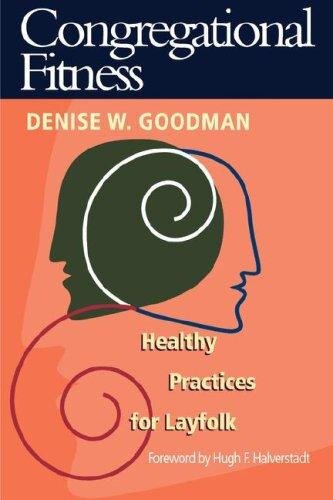Denise W. Goodman, Congregational Fitness: Healthy Practices for Layfolk. Alban Institue, 2000.
Referenced in: Church Conflict – Communication, Healthy Behavior, Forgiveness
LifeandLeadership.com Summary
This is an excellent work from the Alban Institute, especially as it relates to conflict prevention and ongoing management. Goodman explores why congregations are prone to conflict and describes healthy habits members can develop to handle conflict constructively. Goodman argues that church members need to develop sound habits because they are the ones who must carry on, from one pastor to another, and who have the opportunity to discontinue the patterns energy-draining and destructive behaviors. Designed for use by individuals, study groups, and retreat participants.
Goodman begins by describing why churches fight and why both members and leaders need to be well-equipped regarding conflict. This is followed by a discussion of the differences between normal/ healthy conflict and destructive conflict (i.e. why conflicts that have the potential to energize and strengthen a congregation are rarely given the opportunity to do so). Next, Goodman equips people to spot danger areas and develop skills to keep conflict in the healthy zone. Issues include resolving clashing generational expectations or visions, taking responsibility, refusing to be a spectator or bystander, being accountable, staying out of triangles, reducing anxiety through thoughtful listening, living with ambiguity, overcoming denial and pious platitudes, cleaning up skeletons in the congregational closet and discovering a common story, exorcising ghosts (ugly inherited behaviors), facilitating healthy pastor-parish relations, calling in outside help, and overcoming wounds from hurtful church experiences.
From the Publisher
When serious conflict surfaces in a congregation, lay people are usually stunned. They feel frightened, angry, and helpless. Congregational Fitness explores why congregations are prone to conflict and describes healthy behaviors lay people can practice to manage conflict constructively. Goodman argues that since it is members of the congregation who carry on from one pastor to another, it is important for them to know and practice positive behaviors continually, rather than reacting out of emotion and anxiety to an unexpected situation. Designed for use by individuals, study groups, and retreat participants.
***For additional information on this resource, including reviews, click the bookstore links. Check the reference at page top or the links below for resource guides on related topics.***
Related Areas
See Other Resources on Church Conflict:
See Resources on Over 100 Areas of Ministry Leadership:


